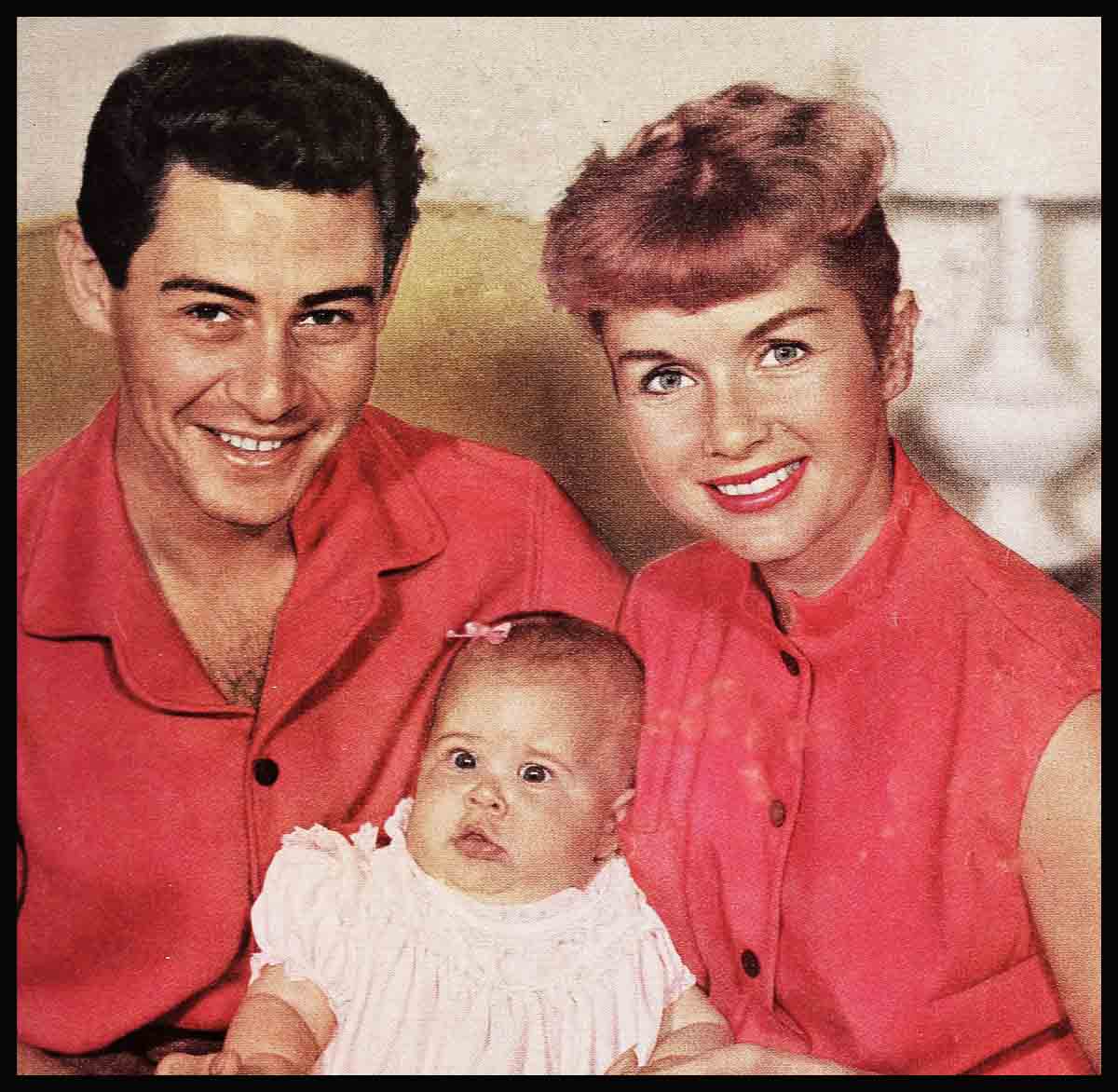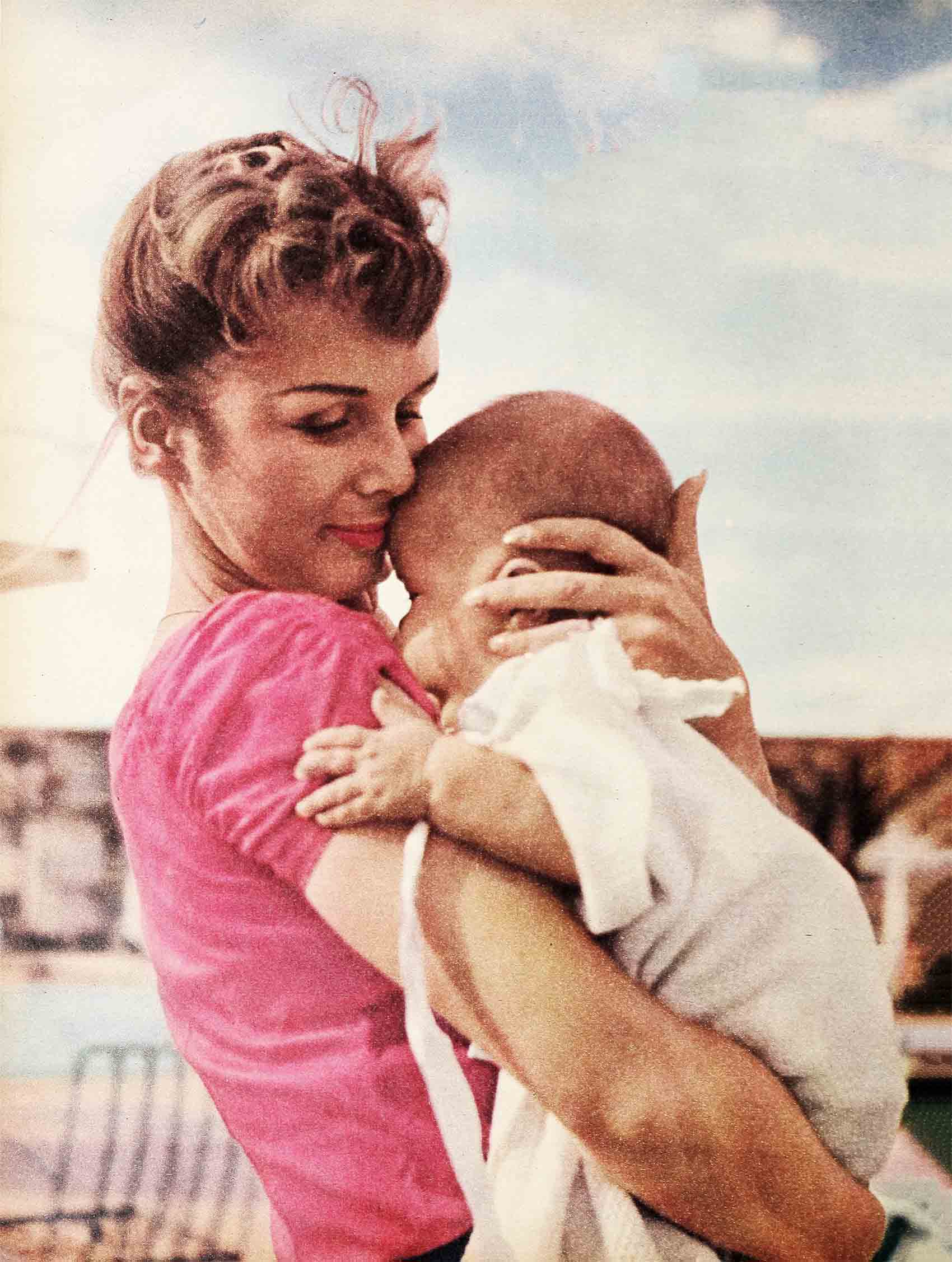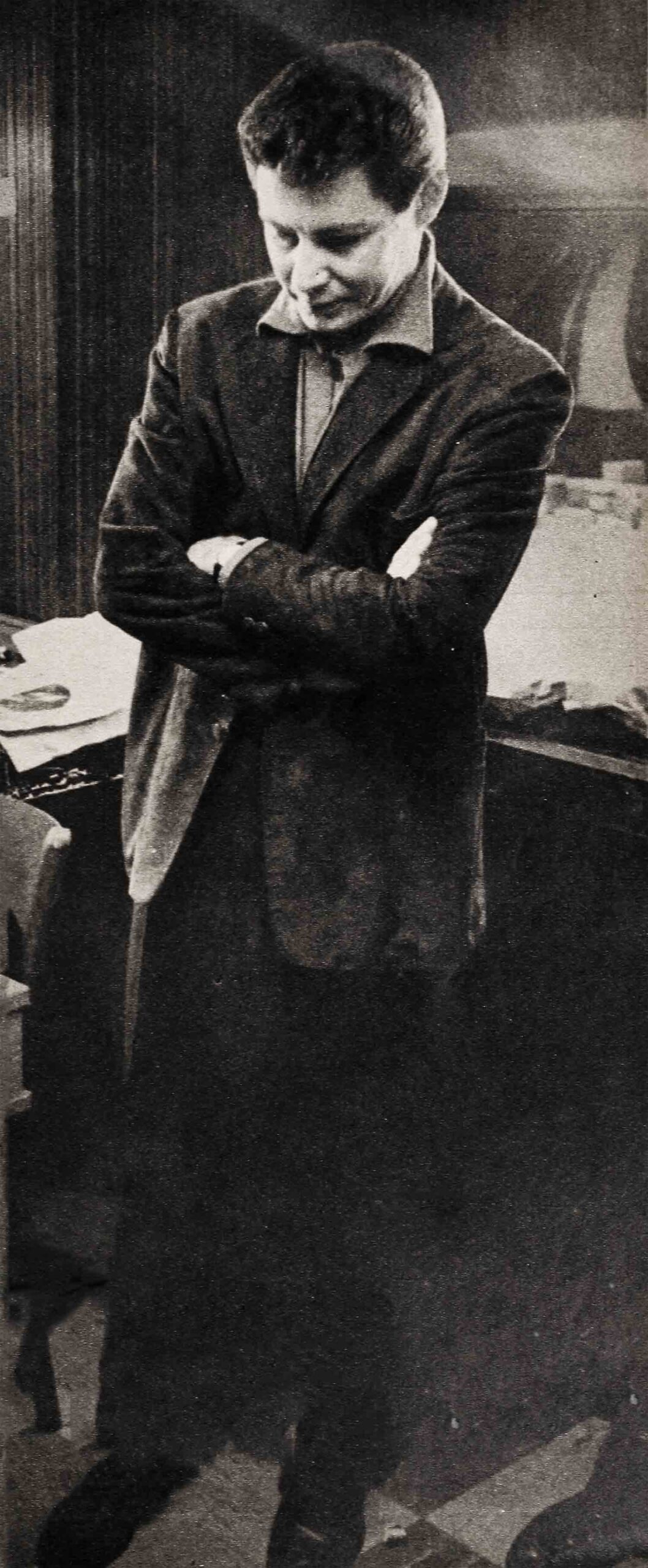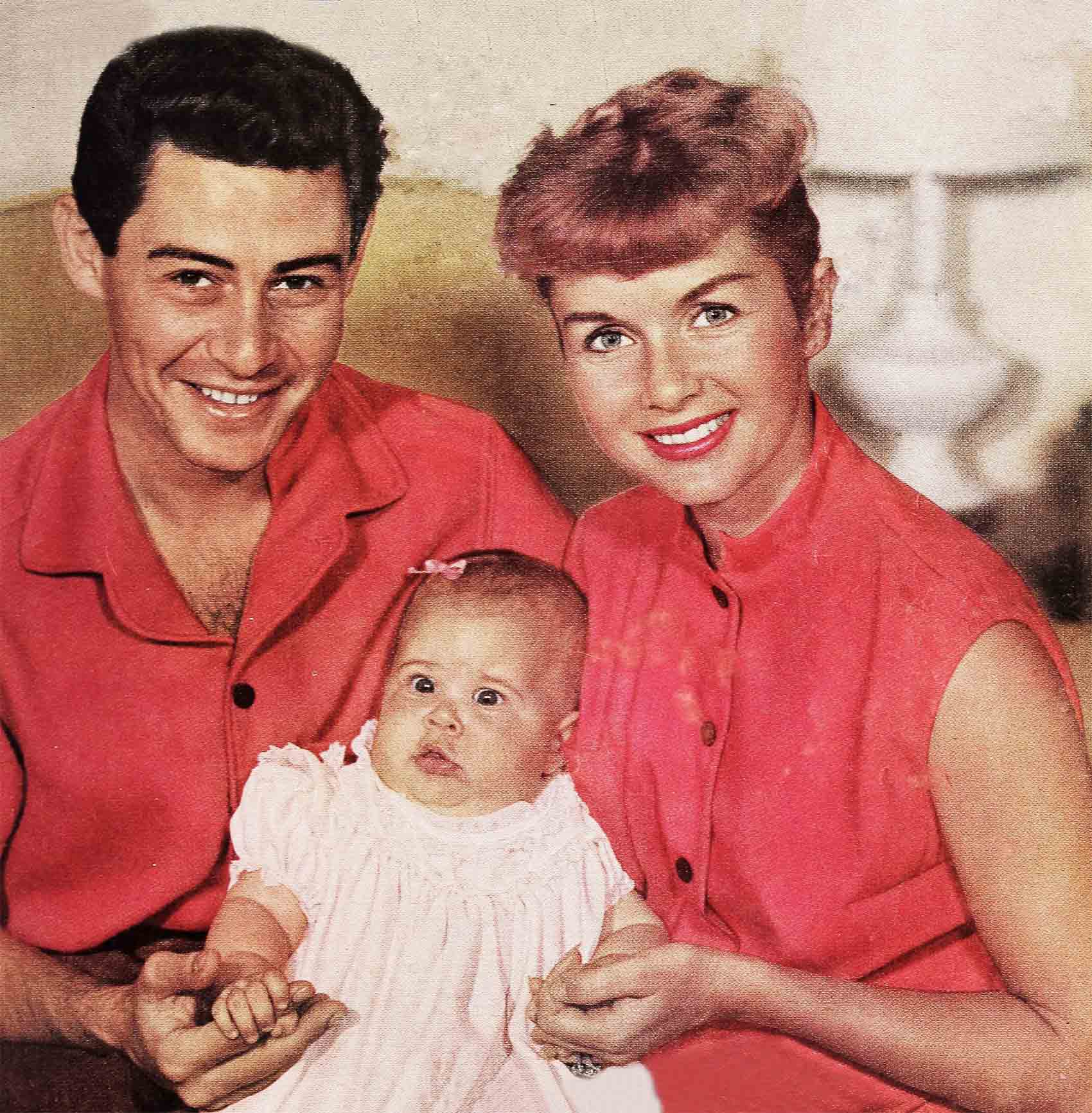
Is Debbie Reynolds A Good Mother? . . . Will Eddie Fisher Settle Down?
Debbie Reynolds once told me, and not so very long ago at that, “I’m so busy, if I got married now I’d have to give my husband a picture of myself, so he’d know what I look like!”
My, how that attitude has changed! Debbie’s still busy—even busier, she thinks, than when she thought making pictures didn’t leave much room in her life for a husband. But what a different kind of busyness—ever since she became Mrs. Eddie Fisher!
Take their life in Las Vegas, right now at this writing, where they’re calling the Tropicana their home for five weeks. Eddie opened the elegantly beautiful hotel, Las Vegas’ newest, as the headliner. Outside is the plush sophistication of a luxurious resort hotel. In the background is that feverish Las Vegas music—the whirr and clack of the gambling casino. In the Tropicana, the whirr is a discreet murmur, subdued like footsteps falling into thick carpets.
You can leave that behind you, by entering the Fishers’ own haven. You walk down a blue-carpeted, white-walled hall to rooms 148-49-50. You open the door to 150, and you’re in a nursery. A nursery just like in that nice house on Shady Lane, Anytown. Complete with baby. There’s a play pen inhabited by a couple of pink, cuddly lambs. Carrie Frances herself is lying in her bassinette, holding tight to a rattle in her sturdy, sweet fist, regarding it with great interest out of her brown eyes.
Brown?
Well, that they’re the shape of Eddie’s, there’s no denying. But the oe: color is the grey of Debbie’s the way they are when the light doesn’t change them to blue. But Debbie says positively “Oh, they’re going to be brown!” So Carrie Frances, who has her father’s eyes, coos and makes happy talk, smiling up from her friendly world. Her nurse, Miss Lane, who obviously speaks her language, was getting her lunch ready and telling her at the same time, “It won’t be long now.”
Debbie was wearing tailored pajamas and bare feet. It was eleven-thirty—in the morning, that is—which is pretty early for Vegas. She switched her chestnut pony tail toward an open door and said, “Come on into the sitting room.” It was more interesting where Carrie Frances was but I followed Debbie into the next room.
I said, “Aren’t you going to have any coffee?” She answered, “I don’t drink coffee. Anyway, I always wait for Eddie to have breakfast. He’s working hard and likes to sleep late. You know me, trained to those early calls on the set. Anyway, I like to get up so I can be with the baby.”
I added, “Well, you look very far from a movie set, right now.” Debbie answered, “Busy life, busy schedule! If I had kept up my own schedule, it would be impossibly busy. The solution is so simple. I just don’t leave my husband to make a picture. You miss too much of marriage being apart. I’d rather be a wife than an actress. Maybe a weekend apart once in a while is all right. It’s so nice to see each other again.”

The two-week separation
Carrie Frances was making herself heard from the next room, giving out with a fuss that threatened to turn into a cry. Debbie said, “Well, what’s the matter with her?” and went to see for herself. She came back with her in her arms, Carrie Frances holding tight to her bottle.
Miss Fisher, midway through her bottle, gave a satisfactory burp. “Gosh,” said her mother happily, “aren’t babies something?” and picked up our conversation exactly from where we were when she went out of the room. “When Eddie went East for two weeks and a half, it was the first really long separation we’d had. I had planned to go with him, but the baby was only four months plus, and the doctor thought it would be too cold and she shouldn’t make the change. I wouldn’t leave her, so I changed my plans.
“The press had asked me, so I had told them I was going with Eddie. When I didn’t, they jumped to the usual quick conclusion: that we’d had a quarrel. So when I did take off to join Eddie for the last three days, leaving the baby with my mother, I was the one going after him to reconcile. At least, that was the impression in the newspaper stories.
“What actually happened was that Eddie had to break in the show he’s doing here, at the Tropicana. He was at the LATIN QUARTER in Philadelphia and BLINSTRUB’S in Boston. I joined him in Boston; we went to New York and caught a few shows, and then we came home. It hurts when people print stories that are their own conclusions, but I’ve gotten used to it.”
A trip abroad
Carrie got the rest of the bottle, after which the nurse carted her away to sleep off that lunch. Debbie looked so contented, so much at home in that hotel suite, I couldn’t help asking, “Do you really like this gadding about—with a baby, yet?” She smiled that quick, wide smile and said, “Yes I like it—because we’re together. And as the family grows, the family will all be together.”
Right then, she was planning for their trip to Europe at the end of May. Carrie Frances isn’t going along this trip—still too young to chance gallivanting around strange countries. She’ll stay home in safe hands—with Debbie’s mother.
The trip abroad is because Eddie has a two-weeks engagement at the LONDON PALLADIUM in June. Debbie said, “I haven’t really seen Europe, except for some sight-seeing in London, and one day in Paris.” That was exactly the same time of year in 1955, when they were engaged, and Debbie and her mother went over while Eddie was at the PALLADIUM. This time, Debbie said, “Eddie will have two weeks vacation after the PALLADIUM, and we’ll be able to do all the things we didn’t do then.”
As for leaving their pride and joy with mother, Debbie said, “Carrie has a lifetime of traveling ahead of her. I have never been one to foresee the future, but it looks like that’s the way it’ll be.”

Debbie’s philosophy
Debbie’s pet philosophy has always been, “I never worry about anything that hasn’t happened yet.” I remember asking her what she expected out of marriage, and her answer, prior to the event was, “How do I know about something I haven’t tried yet?”
It’s a philosophy that seems to have worked pretty well for her. Even her views on no separations seem to have been solved pretty neatly. Eddie will be doing his new TV show, alternating weekly with George Gobel, from Hollywood. “Of course,” said Debbie, “Eddie will have to be in New York at various times out of the year for records and other business.” But there will be no night club engagements during the show season. The Fishers can plan on being home folks part of the time, anyway.
So far, Debbie Reynolds hasn’t frantically tried to fit a career and a husband together, if it meant they had to be apart. She turned down a picture she would have liked to do at UNIVERSAL-INTERNATIONAL, because it meant she couldn’t go to Europe with Eddie. “Maybe,” she said, “they’ll hold it, and I can do it later.”
How does she feel about making adjustments like that, a different way of living, different schedules? Down-to-earth Debbie just hands you a level look out of those big eyes and says, “Every girl does this when she gets married.”
Meet half way
But Debbie isn’t one to cope. She said, “I don’t like to lean on a plan.” There are no rules in the Fisher menage for making the marriage work. No little fetishes like never go to to sleep on a quarrel, or never leave home without a parting kiss, no matter what.
Ask her about the quarrels and misunderstandings that are a part of marriage, and she says, “I won’t discuss that. We don’t discuss it. One person cannot change another, so there’s no use trying. I am the kind, if I had a disagreement, I would try to forget it. I can’t quarrel; I just wouldn’t do it. Eddie doesn’t get angry; he just gets very quiet. Fussing never solved anything.
“But letting ill feeling fester inside you is still worse. I find the best thing, if you do get angry over something, if you think something is unfair, if it is important enough, the situation will still be there later. Simmer down, get a perspective on it, then you can discuss it. That way is not likely to lead to quarreling. Talk it out, and at all times, try to be understanding. If you go along with the other person as much as possible, you’re almost sure to meet each other half way. We don’t have any problems; we never let anything get that big.”

Fanny Fisher’s problem
Debbie gave with a reminiscent smile. “I can think of one example of how people can see things together.” And she went on to relate the tale of Fanny Fisher, the toy poodle Eddie gave her when they were engaged.
“Then,” said Debbie, “later on, Eddie got me the other poodle, Rocky. Let’s see, it was when I was pregnant; yes, I was making Tammy at U-I.” Debbie is apt to trace all events now by the time of her marriage, or before and after Carrie Frances. “Anyway, after Rocky came Fanny just refused to remember she was housebroken! We were desperate, and Eddie said, ‘We’ll have to give her away.’ I said, ‘Not yet!’
“I took Fanny to my dog instructor, where both she and Rocky go to school. After a long talk, she explained that Fanny’s trouble was that she felt that because we got Rocky, we loved her less. Being un-housebroken was her way of getting our attention. When I came home and told Eddie he laughed, ‘Dogs don’t go to psychiatrists!’ Nevertheless, he was willing to go along with the show-the-love program. You know—it worked!”
Father and daughter
The door from the adjoining bedroom opened and in walked Eddie, dressed in handsome grey shirt and slacks and looking fresh as the morning—which it wasn’t any more. He looked casually and comfortably at home, like any fellow who had just had a good night’s sleep and was ready for a good breakfast, but with that slightly shy expression Eddie Fisher never seems to shed. He said “Hello” to me, kissed Debbie, said, “Where’s my girl?” and shot into the next room like a rocket. Came sounds of lots of father and daughter talk, strictly personal stuff that concerned just the two of them. The general effect was that they were enjoying it, the two of them having a ball.
“No change,” says Debbie
From the nursery Eddie’s voice called, “Debbie, how about some of those little pancakes and bacon?” Debbie answered, “All right with me. Who’s calling room service?” “Me,” said Eddie.
The impression around those who know Eddie Fisher is that marriage has matured and changed him, that the boy has grown up. Eddie of the continuous retinue of people around him, Eddie who would go on buying sprees like there was no tomorrow; that, says the smart money, has all changed.
I broached this “New Eddie” phase to Debbie. Over the father-daughter talk still going on in the nursery, she said vehemently, “Eddie hasn’t changed. The difference is that before he was a bachelor; now he’s a married man. Look, you’re here. Have you seen scads of people milling around like it was Grand Central? Of course, Eddie has to have some people around him. He has to have his piano player—how could he sing without him? And his manager Milton Blackstone.”
To Debbie, Eddie hasn’t changed—because she didn’t marry him to change him. And, in knowing what he wants, the boy hasn’t! At the height of the worldwide speculation about their engagement, even the Duke of Edinburgh has been interested enough to ask him, in London, “Are you really going to marry that girl?” and Eddie had replied, “I certainly am, sir.”
The subject of this controversial conversation came back into the room and perched on the arm of Debbie’s chair. I said, “We’ve been talking about all your ‘phases.’ Clothes—cars. What is it now?”
A most intelligent phase
Eddie grinned that appealing, half-shy grin. “I think I am going through my most intelligent phase. I am concentrating on being happy—on enjoying myself and getting the most out of life. I am learning to live a little—to take things in stride and not get too wound up. That means settling down in California—and maybe raising seven kids.”
This wasn’t any news to Debbie. It’s what they’ve both wanted from the beginning. No stress, no strain. To Debbie, that’s the way it should be.
The phone rang. Mr. Fisher was wanted at rehearsal. He got up off the arm of the chair, said, “Got to go,” kissed his wife again and took off—through the nursery.
I raised an eyebrow at Debbie Fisher, which is what she likes to call herself. “No more extravagances at all—like unexpected, expensive gifts?”
Debbie said, “Naturally, Eddie has a lot of clothes, so do I. We need them and make use of them. Extravagance is a lot of clothes hanging in a closet that you don’t need. We give each other gifts the usual times—birthdays, Christmas, holidays. Of course, there are some exceptions—but since when don’t you give someone you love a gift just because you feel like it?
“Oh, yes. Carrie sent Eddie flowers opening night here. He liked that. When he had the accident, she sent flowers again.”
Old-fashioned type marriage
Eddie picked the name Carrie for his daughter because it had a nice, old-fashioned flavor. The second name comes from Debbie’s own, having been christened Mary Frances. This modern young pair likes an old fashioned type marriage, too—in believing that being married means being together.
Plans for that include a home, to be built this year. Debbie says, “Eddie and I always liked country English, but we don’t like too large a home.” That’s where the problem started. In one year and three months it went this way: First, they rented a one story, but rambling English in Pacific Palisades. They thought it was a wonderful country manor type home but found it was too much. Then Debbie became pregnant while she was working in Tammy and the drive to the studio got to be too far. So they rented a two-story, still English but more urban, in Beverly Hills. Fire destroyed the master bedroom, and in Debbie’s words, “It was quite a mess.” They moved to the Beverly Hills Hotel while regrouping, and then they bought a house. They’ve been in it three months, and it’s up for sale.
“It’s just too large, too spread out,” said Debbie. “We’ll live in it until it’s sold but we know what we want now, and we’ll have to build to get it. Something nice and compact, combining country English in a small house. Something,” added Debbie, “that I could take care of myself, if I had to.”
Of course, Debbie is the girl who wanted to be a gym teacher—so she’s always known the value of team work. The way she sees it, that applies to playing the marriage game, too. The other half of the team likes it, he likes it. Which prove a nice point: It could happen in Hollywood.
THE END
—BY HELEN GOULD
Debbie’s currently in U-I’s Tammy And The Bachelor and will soon be seen is MGM’s The Reluctant Debutante.
It is a quote. MODERN SCREEN MAGAZINE AUGUST 1957




